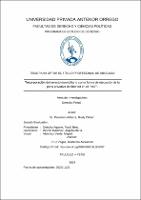| dc.contributor.advisor | Cruz Vegas, Guillermo Alexander | |
| dc.contributor.author | Palomino Arbaiza, Rudy Climen | |
| dc.creator | Palomino Arbaiza, Rudy Climen | |
| dc.date.accessioned | 2024-05-06T22:25:42Z | |
| dc.date.available | 2024-05-06T22:25:42Z | |
| dc.date.issued | 2024 | |
| dc.identifier.uri | https://hdl.handle.net/20.500.12759/28331 | |
| dc.description.abstract | La presente tesis aborda uno de los problemas relacionados con el sistema de
sanciones en el ámbito penal que tiene nuestro país, y específicamente el de la
ejecución de las penas privativas de libertad fuera de los centros penitenciarios: en
el domicilio del penado, situación que solo se presenta en muy pocos a nivel del
derecho comprado y que tenemos en el país pero solo como medida de coerción
personal, es decir, como una medida previsional y sustitutoria de la prisión preventiva
mientras un ciudadano es investigado por la comisión de un presunto delito; es decir,
el arresto domiciliario es una medida preventiva de carácter personal que se aplica
al procesado, más no un sanción penal o forma de ejecución de la pena privativa de
la libertad.
Lo que se pretende instituir justamente con esta investigación es que la detención o
arresto domiciliario, sea en el Perú a la luz de los principios que gobiernan a las
penas, en una forma de ejecución de la pena privativa de la libertad, es decir, en un
sanción penal propiamente dicha y no solo sea- como hasta ahora- un mecanismo
provisional de aseguramiento o sujeción del imputado al proceso penal, para lograr
la pretendida eficacia del sistema penal y la persecución eficiente del Estado para
hacer posible el ejercicio del ius puniendi Estatal.
En ese contexto a lo largo de la investigación se dirigen los esfuerzos en señalar las
bases sustentadoras que avalen la postura de legislar como sanción la prisión o
arresto domiciliario, como sucede en Argentina, por mencionar algún país cercano
de la región | es_PE |
| dc.description.abstract | This thesis deals with one of the problems related to the system of sanctions
in the criminal field that our country has, and specifically that of the execution
of custodial sentences outside prisons: at the prisoner's home, a situation that
only it is presented in very few at the level of purchased law and that we have
in the country but only as a measure of personal coercion, that is, as a
provisional measure and substitute for preventive detention while a citizen is
investigated for the commission of an alleged crime; that is, house arrest is a
preventive measure of a personal nature that is applied to the defendant, but
not a criminal sanction or form of execution of the custodial sentence.
What is intended to institute precisely with this investigation is that the
detention or house arrest, be in Peru in light of the principles that govern
penalties, in a form of execution of the custodial sentence, that is, in a criminal
sanction itself and not only be - as it has been up to now - a provisional
mechanism for securing or subjecting the accused to criminal proceedings, to
achieve the alleged effectiveness of the criminal system and the efficient
prosecution of the State to make possible the exercise of the State ius puniendi
.
In this context, throughout the investigation, efforts are directed at pointing out
the supporting bases that support the position of legislating prison or house
arrest as a sanction, as is the case in Argentina, to mention a nearby country
in the region | es_PE |
| dc.description.uri | Tesis | es_PE |
| dc.format | application/pdf | es_PE |
| dc.language.iso | spa | es_PE |
| dc.publisher | Universidad Privada Antenor Orrego | es_PE |
| dc.relation.ispartofseries | T_DERE_655 | |
| dc.rights | info:eu-repo/semantics/openAccess | es_PE |
| dc.rights.uri | https://creativecommons.org/licenses/by/4.0/ | es_PE |
| dc.source | Universidad Privada Antenor Orrego | es_PE |
| dc.source | Repositorio Institucional - UPAO | es_PE |
| dc.subject | Pena | es_PE |
| dc.subject | Pena Privativa de Libertad | es_PE |
| dc.subject | Arresto Domiciliario | es_PE |
| dc.title | Incorporación del arresto domiciliario como forma de ejecución de la pena privativa de libertad en el Perú | es_PE |
| dc.type | info:eu-repo/semantics/bachelorThesis | es_PE |
| thesis.degree.level | Título Profesional | es_PE |
| thesis.degree.grantor | Universidad Privada Antenor Orrego. Facultad de Derecho y Ciencias Politicas | es_PE |
| thesis.degree.name | Abogado | es_PE |
| thesis.degree.discipline | Derecho | es_PE |
| dc.subject.ocde | https://purl.org/pe-repo/ocde/ford#5.05.00 | es_PE |
| renati.advisor.orcid | https://orcid.org/0000-0002-9119-5397 | es_PE |
| renati.author.dni | 02818511 | |
| renati.advisor.dni | 43414679 | |
| renati.type | https://purl.org/pe-repo/renati/type#tesis | es_PE |
| renati.level | https://purl.org/pe-repo/renati/level#tituloProfesional | es_PE |
| renati.discipline | 421016 | es_PE |
| renati.juror | Ortecho Aguirre, Roció Belu | |
| renati.juror | Rincón Martínez, Angela María | |
| renati.juror | Albornoz Verde, Miguel. | |
| dc.publisher.country | PE | es_PE |




